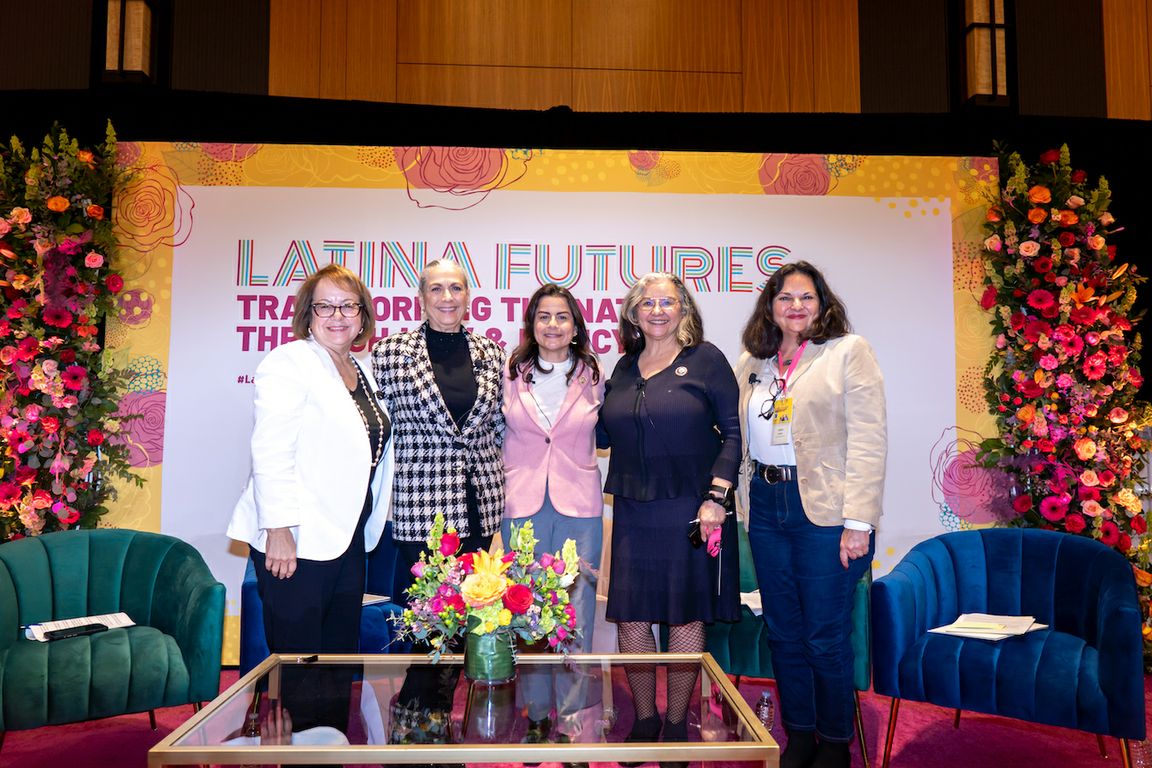Empowering Latina Voices: Highlights from the Latina Futures Symposium at UCLA
Eminent policymakers and scholars address today’s law and policy challenges
By Cristian Rivera
January 29, 2024
By 2050, Latinas are expected to make up 13% of the U.S. population, account for 11% of the labor force, and have a median age 11 years younger than their white counterparts. Yet Latinas comprise only 2.5% of all U.S. lawyers, account for less than 1% of all partners in law firms and have never served on the highest court in 44 states.
To address this alarming gap in Latina representation and leadership in law and policy, the UCLA Latino Policy and Politics Institute, the Latina Futures, 2050 Lab, the Latina Lawyers Bar Association, and the UCLA Chicanx Latinx Law Review hosted the inaugural Latina Futures: Transforming the Nation Through Law and Policy symposium.
The sold-out event, which took place Jan. 20 and 21 at UCLA’s Luskin Conference Center, brought together nearly 400 prominent Latina scholars, attorneys, politicians, policy leaders and students from across the country to explore today’s legal and advocacy challenges and opportunities through a Latina lens.
“This weekend, we are replacing the status quo with forward-thinking, accurate, and necessary contributions from Latina leaders now and well into the future,” said Sonja Diaz, founding executive director of the Latino Policy and Politics Institute and co-founder of Latina Futures, 2050 Lab, in her opening remarks.
The event featured 11 panels and plenary sessions, two fireside chats, a keynote and networking opportunities that touched on a variety of topics, including affirmative action and reproductive justice, the intersectionality of Latina and LGBTQ+ identities, and avenues toward advancing legal and policy reforms that promote equality and inclusion. Participants shared personal and professional experiences that highlighted the need to increase the representation of Latina leaders in decision-making positions.
Among the symposium’s 70 speakers was California Chief Justice Patricia Guerrero, the first Latina in this role, who spoke about her journey from the Imperial Valley and the challenges she overcame.
In a fireside chat moderated by Margaret Salazar-Porzio, Mary Murguía, chief judge of the 9th U.S. Circuit Court of Appeals, and her sister Janet Murguía, CEO and president of the civil rights and advocacy nonprofit UnidosUS, delved into their paths towards leadership and the hope they have for future leaders to unite Latino communities and the nation in an increasingly divided world. U.S. Rep. Nanette Barragán, a UCLA alumna from the class of 2000, California state Sen. María Elena Durazo, New Mexico state Sen. Antoinette Sedillo-Lopez, and Texas state Rep. Maria Luisa Flores shared their perspectives with Laura Gómez, a professor at UCLA School of Law, on the need for a Latina lens in policymaking across all levels of government.
In addition, Vilma Martinez, U.S. ambassador to Argentina and former president and general counsel of MALDEF, the Mexican American Legal Defense and Educational Fund, challenged attendees to take ownership of the future and contribute to a more inclusive and equitable society.
Reflecting on the 50-year anniversary of MALDEF, Martinez told the audience during the program that she felt an initial sense of disappointment because she thought the organization’s work would have been completed by this time. However, she continued, her feelings shifted with her recognition that our nation is built on grand aspirations and ideals — and achieving them is a long and continuous process.
Professor Veronica Terriquez, director of UCLA’s Chicano Studies Research Center and co-founder of the Latina Futures, 2050 Lab – shared her vision for the future.
“Together, we will tackle the most pressing social problems by taking an intersectional approach to our work. We must proceed in ways that are mindful of the diversity of our communities and inclusive of the voices of those often marginalized,” she said. “ We have the potential to inform social, political, and economic changes that benefit the majority of this nation.”
Terriquez expressed her hope that the symposium would inspire participants to continue their advocacy and leadership. “I hope you feel energized from this weekend and will continue to fight for our communities,” she told the audience. “This is a long game, and it builds on the work that came before us.”

